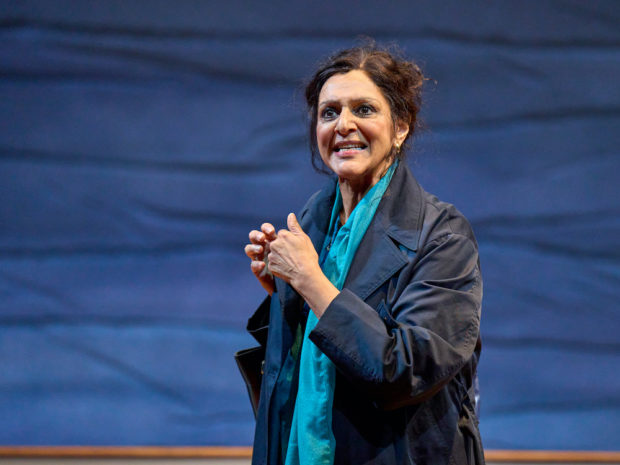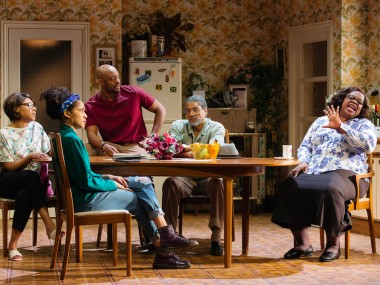A Tupperware of Ashes, National Theatre
Wednesday 2nd October 2024

Queenie is in trouble. Bad trouble. For about a year now, this 68-year-old Indian woman has been forgetful. Losing her car keys; burning rice in the pan; mixing up memories; just plain blank episodes. At various times, she relives distant moments in her life with her husband Ameet, who died more than 20 years ago. Very soon she is diagnosed with Alzheimer’s. As played by national treasure Meera Syal, who barely leaves the stage during this full-length tragi-comedy by Tanika Gupta, making a very welcome return to the National Theatre, she grows in emotional stature while her incurable condition continues to advance. As the play’s title, A Tupperware of Ashes, indicates, there can only be one conclusion, yet much can happen on the journey.
And it does. Starting in 2019, and set in London, where Queenie is a Michelin-starred chef running an Indian restaurant while bringing up three children, this is a family drama about love and loss. Her children — Raj, a teacher, Gopal, a lawyer, and Kamala, a doctor — are in their thirties and are both individuals, with Raj for example still nursing his inner angry teen and Gopal content as a gay man, as well as symbolic of the second-generation migrant experience. In defiance of Queenie’s expectation that they will take care of her in their homes, despite her spiky attitude to Raj’s pregnant wife Krishna, the children find they cannot cope with her dementia and place her in a care home.
Gupta represents Queenie’s medical condition with enormous sympathy and lack of sentimentality. It’s a tough subject and the playwright doesn’t avoid its difficulty: her Queenie travels from silly forgetful moments, to angry violence (at one pointing physically attacking her sensible best friend Indrani), frightening delusions and scary walkabouts (which ignore the dangers of oncoming traffic). Anyone who has had a relative suffering from Alzheimer’s will recognise this depiction, and will understand the strains that it puts on family life: each of her children are unable to look after her — despite the fact that two of them love her wholeheartedly. At the same time, Gupta uses Queenie’s memories of her husband Ameet to explore, onstage and in front of our eyes, their experience as Bengali migrants to England, and their deep love of the poetry of Rabindranath Tagore, some of which is quoted during the show.
As the months pass and COVID 19 arrives, Queenie’s tragedy intensifies. Left alone in her institutionalized room, with her familiar carer Pavel dressed in PPE and thus unrecognizable, she visibly degenerates, folding in on herself. When Indrani and her children visit, they can only communicate through a closed window, a situation which is a powerful reminder of the terrible times of the pandemic and is here treated with immensely moving simplicity. As ever, Gupta uses flashes of comedy even in the most tragic circumstances. But the general tone of her writing in this play is beautifully empathetic, with a really personal sense of deep emotion, carefully balanced between expressions of love and of loss.
Although cumulatively moving, the set pieces of the story include much light-footed comedy, with scenes set on a beach, in a restaurant, a doctor’s consulting room, a lawyer’s office, as well as at home and in a care home. Central to this family life is food, both as a link to heritage and as a means of blending cultures in contemporary Britain. Food is essential for welcoming, but can be also be unwanted. New foods, new smells, new tastes, can provoke anger. In general, Gupta depicts the racism experienced by new arrivals with restraint — among other things there’s a good jokey reference to Enoch Powell — and the medical and legal facts around dementia are clearly conveyed. For contrast, there are some strongly emotional lines, such as Queenie’s “I wish I’d aborted you”. And moments of Shakespearean lyricism are followed by shocking instances of rejection or anger.
Pooja Ghai’s production begins with designer Rosa Maggiora’s lovely blue backdrop, which is criss-crossed by lines that evoke water, then eventually flash and throb like neural networks. As Queenie, Syal turns in a terrific performance, with a convincingly detailed account that highlights the highs and lows of her condition, while taking refreshing breaks in the scenes with Zubin Varla’s Ameet, which illustrate a happier, more playfully youthful existence. The magic realist element of the story is excellently realized by John Bulleid’s illusion work, and there is one lovely and moving sequence in which a butterfly turns into a hankie. At another moment, time passes in mime. These magic moments complement the poetry of Tagore, and Nitin Sawhney’s superb music likewise deepens the drama’s emotional journey.
Although it’s mainly their characters’ story, Syal and Varla get good support from Raj Bajaj’s Raj, Marc Elliott’s Gopal, Natalie Dew’s Kamala and Shobna Gulati’s Indrani. The family tensions that arise from Raj’s aggression and Queenie’s relationship with Gopal’s offstage wife Krishna are instantly recognisable, and the cast do a very good job in switching from the serious to the more humorous episodes. Their most passionate lines prompt gasps from the audience, but there are also some quiet and tearful passages. And although some of the material is culturally specific to the Bengali community and its diaspora, Gupta also underlines the universal aspects of the big themes of family and food, love and loss. By the time the ashes are sprinkled into the sacred waters you have drunk deep from the well of true feeling and true sadness.
This review first appeared on The Arts Desk




